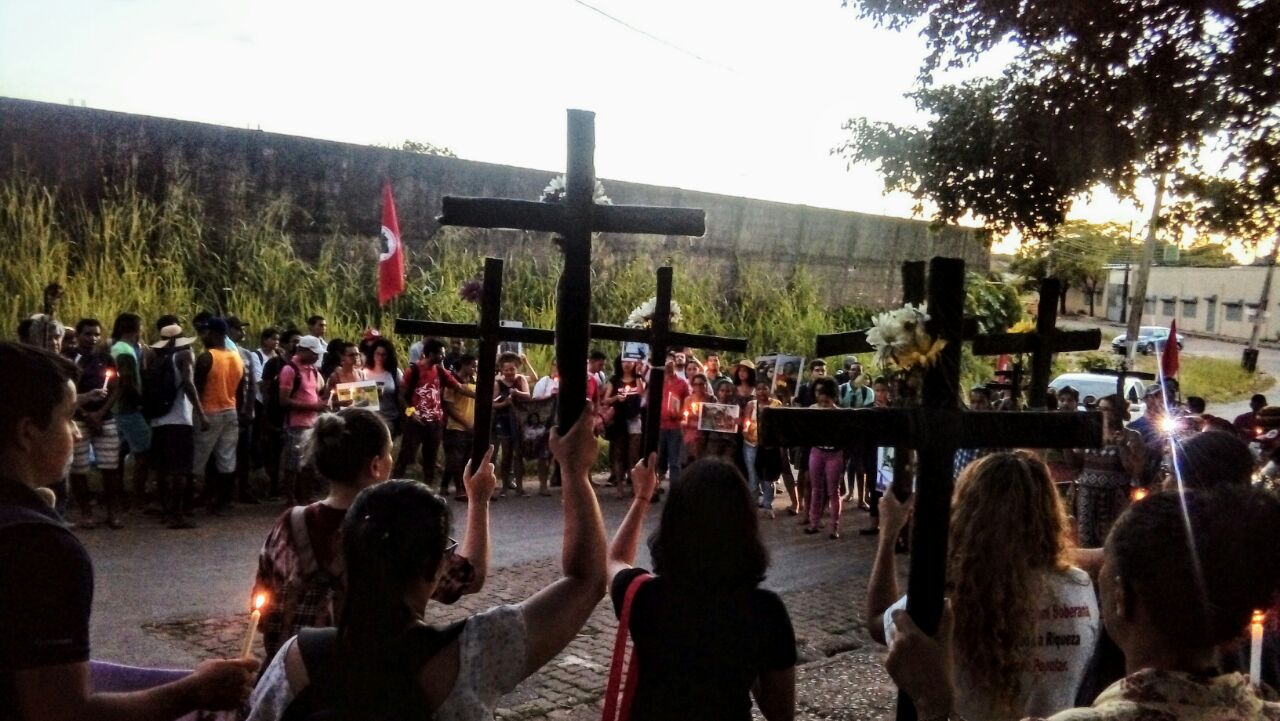According to CPT, in 2016 it were registered 61 murders in conflicts, the highest number since the beginning of the monitoring by the entity.
(25th of May, 2017) Ten squatterers – one woman and nine men – were murdered in the morning of the last Wednesday (24), in the camp Nova Vida, located in the farm Santa Lúcia, city of Pau D’Arco, in Pará (Amazon Region, in Brazil). The massacre started occupying the newscast following the circulation of victims corps images that, according to local media, were taken by policemen to the Rendenção City Hospital morgue and, after that, transferred to the Legal Medical Institute of Marabá and Parauapebas.
According to informations by the Comissão Pastoral da Terra (CPT), the workers, who did not have their identity revealed, were dead during the performance of a possession reintegration issued by the Redenção Agrarian Court judge, Erichson Alves, who, in disagreement to the National Agrarian Ombudsman Code, set the action to be accomplished by military and civilian police. In such situations the Justice Court directions orient the action may be taken by the Battalion of Military Police specialized in conflicts resolution.
In a note addressed to the press last afternoon, the coordinator of Federation of Family Agriculture Workers in the State of Pará (Fetraf, from the Portuguese), Viviane Pereira, said the number of deaths in Pau D’Árco may rise, as there is no precision about the amount of wounded and the health state of the involved people.
Also by a note, the Federal Attorney’s Office for Citizen Rights, from the Federal Prosecution Office, informed that it is in contact with local prosecutors to help investigations. Articulations among Justice General Attorney’s Office, the Nacional Concil for Human Rights, the National Confederation of Bishops of Brazil and the Human Rights and Minority Commission of the House of Representatives are also in progress.
Historical context
Still according to CPT data, in the second semester of last year, during a meeting of the Nacional Commission for Fighting Country Violence, realized in the Nacional Institute for Colonization and Agrarian Reform (Incra) office, in Marabá, the coordinator of the camp, Ronaldo da Silva Santos, warned the 150 families camped in the farm since 2015 wanted the area to be intended to Agrarian Reform.
Facing the request, the former Regional Superintendent of the office in Marabá, Claudeck Alves Ferreira, was committed in meeting with the farm owner and deal its expropriation. That time, it was also in the meeting the former National Agrarian Ombudsman and president of Nacional Commission for Fighting Country Violence, Judge Gercino José da Silva Filho; Aílson Silveira Machado, representing the Justice and Citizenship Ministry Human Rights Secretary; regional representatives of Incra; representatives from the Military Police of Marabá and coordinators of Fetraf.
Violence increase and State connivance
To Ayala Ferreira, from National Direction of Landless Rural Workers Movement (MST), who follows the violence cases in Pará, the State Government is again using the speech that criminalizes the land struggle in the region.
“In 1996, when the massacre of Eldorado dos Carajás happened, the police spoke about confrontation. This one, by the way, is the speech used in every massacre, whether in countryside or in the city. What is important to register here is that it was a ‘confrontation’ where only camped workers were killed. No policeman involved in the action was indentified until now. The Military Police itself disarmed the conflict scenario by removing the corps and carrying them piled in a pickup truck to Redenção”, concluded.
The massacres occasioned by land conflicts all over Brazil have been increasingly intense. According to CPT, in 2016 it was registered 61 murders in conflicts, the highest number since the beginning of the monitoring by the entity, in 2003. In 2017, the total of deaths reached 26, without counting the cases of yesterday.
Last April, nine rural workers were brutally killed by a group of hooded men in a massacre in Colniza, state of Mato Grosso. Until now, none was arrested.
Demonstrations and solidarity actions are being built all over the state to face the violence wave in Pará.
With the decision made by President Temer of extinguishing the National Agrarian Ombudsman, entity responsible for prevent and mediate agrarian conflicts, the situation tends to get worse, once the mediation role lays now in the state governments, which already proved to be incapable to guarantee the safety of rural workers.
By Maura Silva
From MST Web Page

